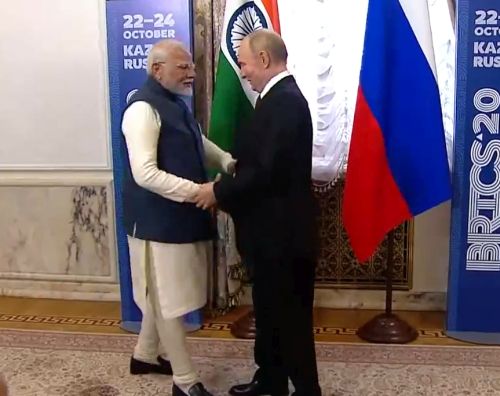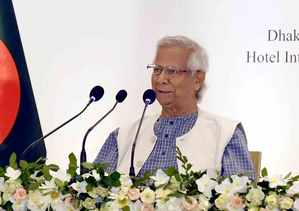International
Is the Middle East conflict-bound as threats and counter-threats swirl in Tehran assassination's wake? (Lead)
New Delhi, Aug 5 (IANS) The Middle East has been a restive and volatile region for most of the 20th century with regular inter-state conflicts till the 1990s, and then, intra-state clashes, with a few exceptions. However, in 2024, the Gaza and the Israeli-Lebanese border conflict is threatening to snowball into a far larger regional war as Iran and Israel weigh strikes on each other in the wake of the Tehran escalation.
The assassination of Hamas political bureau chief Ismail Haniyeh in the Iranian capital, a few hours after he attended President Masoud Pezeshkian’s inauguration on July 30, made the Iranian regime threaten Israel, which it blames for the incident, with “harsh punishment”.
The situation has been further exacerbated with the Iran ally Hezbollah in Lebanon also vowing vengeance for the assassination of its top operative Fuad Shukr in a Beirut airstrike.
However, there has only been threatening rhetoric so far from Iran, which is seeking to bolster support from Arab and other nations before its planned strike, as well as ratchet up apprehension in Israel. The Jordanian Foreign Minister was in Tehran on Sunday and on Monday, Russian Security Council Secretary and former Defence Minister Sergei Shoigu reached the Iranian capital for talks.
While the Islamic Revolution Guards Corps (IRGC) Intelligence Organisation’s former chief Hossein Taeb on Sunday claimed that Iran’s retaliatory response is going to “surprise” Israel and won’t fall within the framework of the scenarios it can predict, the influential force’s commander Maj Gen Hossein Salami on Monday noted that the Iranian response will well-concealed till it occurs.
Significantly, in the discussion on the assassination in the UN Security Council, Iran’s Permanent Representative Amir Saeid Iravani, reserving his country’s “inherent right to self-defence in accordance with international law”, noted it would respond when “it deems necessary and appropriate”.
On the other hand, Israel has also tried to set the agenda, with sources claiming that it is mulling a pre-emptive strike on Iran.
The situation is thus different from the “calibrated” moves in April when Iran launched a massive drone and missile strike on Israel in response to the attack on its consulate in Syria that left some senior IRGC officials dead. At that time, the US and some others were intimated of the attack through third parties, but this time, the perceived provocation is bigger, and thus, liable to trigger a larger Iranian retaliation. It is also likely to involve its “Axis of Resistance” allies like Hezbollah and the Houthis also
Meanwhile the calculus has become more complex with the US rushing additional forces to the region and Israel’s own “threat”.
While the implications of the assassination are going to have implications that will be more pervasive, long-lasting, and largely negative, the ongoing tensions in the region will also have an adverse attempt on the rest of the world.
While the Gaza truce talks have become largely redundant given the elimination of a key negotiator and the reluctance of Egypt and Qatar, the lead facilitators, to associate themselves further in the process in view of such “reckless” behaviour by one side.
In Israel, the beleaguered Benjamin Netanyahu government can exult in the welcome optics of netting a brace of high-profile Hamas and Hezbollah targets, but will face more problems in the long run with more intractable – and invisible – foes to confront. There is also the fate of the remaining hostages to consider.
With the absence of Haniyeh, considered a pragmatist, if not moderate, and open to political solutions, the Hamas mantle could switch back to shadowy – and more unrestrained and unpredictable – figures like Yahya Sinwar, the ostensible mastermind of the October 7, 2023 attacks. Haniyeh’s likely successor could be his predecessor, the more hawkish Khaled Meshal – the target of a bungled Israeli assassination himself – and who has already staked out a maximalist position by refusing to countenance recognition of Israel.
On the larger canvas, the US has again been made to devote attention and effort to the Middle East – or rather stuck in the region’s volatile vortices – a situation that will be welcomed by geopolitical rivals China and Russia as it will find it difficult to focus much elsewhere.
The impact of a conflict in the oil-producing hub if all the sabre-rattling, and the retaliation and counter-retaliation, go out of control, could mean havoc for the world, with the impact on production and transport of goods and fuel, given the chokepoints on both sides of the Arabian peninsula.
The consequences of any misstep by any actor – regional or global – are too catastrophic to contemplate while diplomacy seems to have been relegated to the sidelines, given there is no intermediary trusted by both sides. De-escalation will need a miracle.
(Vikas Datta can be contacted at vikas.d@ians.in)
–IANS
vd
International
Lee Hsien Yang seeks refuge in United Kingdom

Lee Hsien Yang, the youngest son of Singapore’s founding father, the late Lee Kuan Yew, announced on Tuesday that he is now a political refugee in the United Kingdom after seeking asylum from the British government “as a last resort.”
“I remain a Singapore citizen and hope that someday it will be safe to return home,” Lee stated in a Facebook post, as reported by Channel News Asia (CNA).
Citing what he described as the Singapore government’s “attacks” against him, Lee, who is the younger brother of former Prime Minister Lee Hsien Loong, revealed that he sought asylum protection in 2022.
Lee Hsien Yang and his late sister, Lee Wei Ling, who passed away earlier this month, have been in conflict with their brother Lee Hsien Loong over the fate of their father’s home following his death in 2015, resulting in a public dispute that has estranged the siblings.
In an interview with the UK-based newspaper The Guardian, Lee alleged that a “campaign of persecution” compelled him to seek asylum in Britain.
In response to his claims, the Singapore government stated that there is “no basis” for his allegations of “a campaign of persecution” or other assertions regarding political repression in the country.
“Singapore’s judiciary is impartial and makes decisions independently. This is why Singaporeans have a high level of trust in the judiciary,” a government spokesperson remarked.
The spokesperson added that there are no legal restrictions preventing Lee and his wife, lawyer Lee Suet Fern, from returning to Singapore. “They are and have always been free to return to Singapore,” the spokesperson said.
Lee and his wife have been outside of Singapore since 2022, having opted not to attend a scheduled police interview regarding potential offenses related to providing false evidence in judicial proceedings concerning their father’s will and the family home.
Lee and his late sister, who had been living at the property, alleged they felt threatened while trying to fulfill their father’s wish to demolish the house. They also accused their elder brother, former Prime Minister Lee Hsien Loong, of abusing his governmental influence to advance his personal agenda.
International
Indo-Russian ties are stronger than ever before at BRICS

Kazan, Russia: Prime Minister Narendra Modi held a bilateral meeting with Russian President Vladimir Putin on the sidelines of the 16th BRICS Summit.
During the meeting, President Putin remarked, “I recall our meeting in July, where we had productive discussions on various issues. We’ve also spoken over the phone several times. I am very grateful you accepted the invitation to come to Kazan. Today, we will attend the BRICS Summit’s opening ceremony, followed by dinner.”
PM Modi responded by expressing his appreciation, saying, “I sincerely thank you for your friendship, warm welcome, and hospitality. It’s a great pleasure to visit such a beautiful city as Kazan for the BRICS Summit. India shares deep historical ties with this city, and the opening of our new embassy here will further strengthen these connections.”
International
Laos seeks to enhance nutrition amid climate change concerns

Vientiane (Laos), Aug 22 (IANS) Representatives from the Lao government and development partners have attended a conference here titled “Climate Change and Nutrition in Laos: Intersections and Interventions” to discuss the impact of climate change on nutrition in the Southeast Asia country and potential solutions.
Speaking at the conference, deputy director general of the Department of Hygiene and Health Promotion under the Lao Ministry of Health Viengkhan Phixay, said, “We gather to address a critical and interwoven issue: the impact of climate change on nutrition and how we can work together to tackle these challenges,” Xinhua news agency reported.
The Lao government is actively engaged in this endeavor, with numerous policies and initiatives aimed at addressing both climate change and nutrition, Lao National Television reported on Thursday.
“By leveraging the Scaling Up Nutrition network in Laos, which is led by the government, and supported by civil society, donors, and the United Nations, we have a robust platform to tackle the negative impacts of climate change while improving nutrition and overall health for everyone in Laos,” Viengkham said at the conference held on Monday.
The conference featured a series of presentations that not only detailed evidence-based research but also introduced innovative tools for measuring and enhancing nutrition under the impact of climate change.
The conference stressed the critical need for integrated approaches to tackle the intertwined challenges of climate change and nutrition, and setting the stage for impactful future collaborations.
–IANS
int/psd
International
One killed, seven injured in shootout in Iraq

Baghdad, Aug 22 (IANS) A civilian was killed while seven others were injured on Thursday in a tribal shootout in Iraq’s holy Shiite province of Najaf, according to a local security source.
The shootout erupted in the early hours between armed men from the local tribe in the al-Zarga area in northern Najaf, some 160 km south of Baghdad, a local police officer told Xinhua on condition of anonymity.
The clash resulted in the killing of an Iraqi civilian and the injury of seven others, including three Iranian Shiite pilgrims, the source added.
A joint force from the Interior Ministry’s emergency response division and Najaf provincial police arrested 53 gunmen from both sides of the shootout and seized weapons and ammunition, the Interior Ministry said in a statement.
It added that search operations are ongoing to locate additional gunmen and weapons, with more details to be released later.
The incident took place as numerous pilgrims traveled to the city of Karbala to observe Arbaeen, which marks the end of a 40-day mourning period for the killing of Imam Hussein, the grandson of Prophet Muhammad, in the Battle of Karbala in 680 A.D.
Typically, these pilgrims also visit Najaf as part of their journey to Karbala.
–IANS
int/jk/arm
International
Bangladesh seeks $1 billion budget support from World Bank

Dhaka, Aug 22 (IANS) Bangladesh’s interim government has sought $1 billion from the World Bank as budgetary support.
The call came from the country’s Power, Energy and Mineral Resources Adviser Muhammad Fouzul Kabir Khan’s meeting with Abdoulaye Seck, the World Bank’s Country Director for Bangladesh and Bhutan, in Dhaka on Wednesday.
He made the plea as the ministry owes more than 2 billion dollars to suppliers in import costs of power and energy, Xinhua news agency reported.
Khan mentioned that the interim government, which was formed with many pressing mandates, is due to settle a $2 billion debt left by the previous government in the power sector.
He said they have already suspended activities under the much-criticized Quick Enhancement of Electricity and Energy Supply Act 2010 and abolished the government’s power to set energy prices without any public hearing.
On August 5, the former Prime Minister of Bangladesh, Sheikh Hasina, was ousted from her country and power, ending her rule since January 2009.
This event was seen as a massive escalation, with what initially started as student’s protests and resulted in a major crisis in Bangladesh.
Earlier on August 8, Nobel laureate Muhammad Yunus took oath as the head of Bangladesh’s interim government.
–IANS
int/jk/as
-
Video2 years ago
PM Modi Attacks Congress in Karnataka with “Kerala Story”
-
Politics2 years ago
Siddaramaiah & DK Shivakumar sworn in as Chief Minister & Deputy CM respectively
-
Cricket2 years ago
CSK players rejoice 5th IPL title with their families (Pics)
-
Entertainment2 years ago
Karan Deol weds his longtime Girlfriend Drisha Acharya (Pics)
-
Sports7 years ago
History Of Official FIFA WORLD CUP Match balls
-
Entertainment2 years ago
Urvashi Rautela dazzles on Cannes 2023 red carpet (Pics)
-
India2 years ago
Ashwini Vaishnaw: Railway Board recommends CBI probe in the Odisha railway disaster
-
Entertainment2 years ago
Sunny Leone gets ready for Kennedy premiere in Cannes (Pics)






























